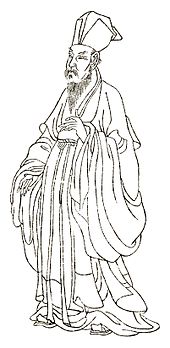Wang Anshi
| Wáng Ānshí | |
|---|---|
| Family name : | Wáng ( 王 ) |
| First name : | Ānshí ( 安石 ) |
| Zì : | Jièfǔ ( 介甫 ) |
| Hào : | Bànshān Lǎorén 半山 老人 (= half a mountain / old man) |
| Posthumous title : | Wén ( 文 ) |
| Nobility title : | Jīngguógōng ( 荊國公 ) |
Wang Anshi ( Chinese 王安石 , Pinyin Wáng Ānshí , W.-G. Wang An-shih , * 1021 ; † 1086 in Nanjing ) was a poet , philosopher and above all reformer , statesman and chancellor in the heyday of ancient China at the time of Song Dynasty . He sought social justice without questioning the foundations of Chinese society and political power.
His nicknames Jièfǔ (介甫) and Bànshān Lǎorén (半山 老人, old man from half a mountain ) are less well known .
Life
Wang came from a family in southern China who provided several holders of the highest official degree (Jìnshì 進士, doctor-like academic degree). After passing the fourth degree of the Chinese Civil Service Examination 1042, he spent twenty years in the regional administration of the lower Yangtze River region. During this time he gathered all the necessary facts and acquired the knowledge that formed the basis of his reform ideas. He came to the conclusion that the state had to guarantee concrete possibilities for an acceptable standard of living for all of its citizens and developed a concept on how to protect the working population (primarily small farmers, craftsmen and day laborers) from social decline or to lead them out of its lowlands be. As early as 1056 he submitted a reform project. Under Emperor Shenzong (ruled 1068-1085), the reforms of Wang Anshis were implemented in 1069. His main concern was to improve the situation of the small farmers, who carried the entire burden of direct taxes and compulsory labor. The same applied to the small craftsmen who were dependent on so-called publishers and trade guilds ( hang , chin. 行).
Specifically, it was about establishing a (price) equilibrium on the food market, reforming property taxes according to income, changing transport regulations for taxes in kind, converting services (for the state) into taxes, low-interest state loans for farmers against pledging Harvest, a military constitution with the introduction of the baojia militia system, state participation in wholesaling and much more. The "disadvantaged" were the large merchants, usurers and large landowners who had previously profited from the weaknesses of the laws. Because the privileges of the lower Chinese nobility were affected by the reforms , the officials, who mostly came from this class, undermined his reform approaches. Wang's best-known opponents were the writers Ouyang Xiu and Su Dongpo .
Wang Anshi, who is occasionally tagged as a state socialist today, saw one of the causes of the state's plight in the unsuitable civil service. He made many opponents by interfering with the examination system and introducing subjects such as medicine and military affairs into the examination canon. If you consider the privileges at stake, you can understand why many of the Confucian-educated officials bitterly opposed the reforms. Wang Anshi's Ten Thousand Words Memorandum says that instead of knowledgeable, capable officials, there are trained writers who have good memories and can recite many texts but are used for tasks for which they are unsuitable. In addition, the salaries of the officials are so inadequate that they have to rely on gifts and blackmail.
The most important reforms were aimed at improving the situation of the peasants, because Wang Anshi saw agriculture as the foundation of the state. With government loans z. B. the usury of interest can be prevented. But the loans imposed on farmers by ambitious officials also had negative consequences. Even so, there was little evidence that the reforms as a whole had failed. The so-called New Laws (xin fa, 新法) had been in place for nearly twenty years, during which time the Chinese Empire remained calm, despite warnings from opponents that the new policy would provoke a new popular uprising like An Lushan's .
Wang Anshi could not keep himself at court and was exiled in 1076. Although he was reinstated in 1078 and his policy continued to be officially pursued until the death of Emperor Shenzong in 1085, but with less emphasis than before. Then he was again disempowered and had to watch the beginning destruction of his life's work: In his place came the conservative Sima Guang (* 1019, † 1086), who represented the large landowners and wealthy merchants and revoked the "new laws". Wang retired to Jiankang (建康), today's Nanjing, and devoted himself to the sciences.
After the death of the two rivals in 1086, the struggle of their parties continued. Wang Anshi's party did not come back to power until 1093, but now it lacked righteousness and foresight, people only advocated reform in name and instead fought for power. Nevertheless, the state remained internally stable for several decades. Today's economists consider Wang's reforms and principles to be comparable to those of a modern welfare state .
literature
- HR Williamson: Wang An Shih: A Chinese Statesman and Educationalist of the Sung Dynasty . 2 vols., Arthur Probsthain, London 1935–1937 ( Probsthain's Oriental Series ).
- Gregory E. Anderson: To Change China: A Tale of Three Reformers (PDF; 351 kB) . In: Asia Pacific: Perspectives 1 (2001).
- Denis Twitchett , Paul Jakov Smith (eds.): The Sung Dynasty and its Precursors, 907-1279, Part 1 (= Cambridge History of China 5). Cambridge University Press, Cambridge 2009.
| personal data | |
|---|---|
| SURNAME | Wang, Anshi |
| ALTERNATIVE NAMES | 王安石, 介甫 (Jiepu); 半山 老人 (Banshan Laoren) |
| BRIEF DESCRIPTION | chinese reformer |
| DATE OF BIRTH | 1021 |
| DATE OF DEATH | 1086 |

